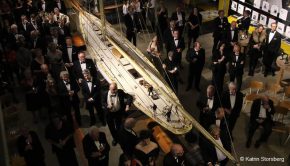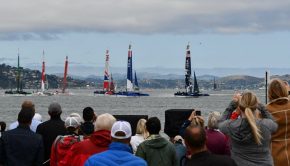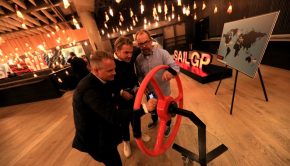Larry Ellison: Follow Your Dreams
Published on May 14th, 2016
Larry Ellison, owner of America’s Cup defender Oracle Team USA, addressed the University of Southern California’s graduating class of 2016 on Friday, May 13th. Just days earlier it was announced that Ellison had pledged a $200 million gift to USC to establish the Lawrence J. Ellison Institute for Transformative Medicine.
Below is a summary of his speech posted on The Oracle Blog:
Oracle founder Larry Ellison urged the more than 12,000 degree candidates to heed a lesson he learned early in his career: Follow your own dreams, not those of your well-meaning family and friends.
And if you’re not sure what you want to do with your professional life, he said, “keep searching until you find a job that ignites your passion.”
Ellison, awarded an honorary doctorate of humane letters at the 133rd USC commencement ceremony, related his own journey from college dropout to founder and builder of one of the world’s most successful technology companies.
Early on, his family and teachers pushed him to become a doctor, “considered the pinnacle of professions,” especially in the lower middle-class Chicago community where he grew up. But after a few difficult years as a pre-med student, Ellison said, it became painfully clear to the 21-year-old that the medical field wasn’t for him. (He described his comparative anatomy class in particular as a “perversely pointless form of psychological torture.”)
“At the time, I thought I lacked discipline, and that I was selfish,” he recalled. “Maybe so. But whatever the underlying reasons, I was unable to make myself into the person that I thought I should be. So I decided to stop trying.”
It was the ‘60s, and Ellison packed his belongings—jeans, leather jacket, guitar, and all—and drove to Berkeley, California, to find his own way. Three hours east of Berkeley, Ellison fell in love: with the Sierra Nevada mountains “and the ineffable, natural beauty of Yosemite Valley.” He joined the Sierra Club, became an environmentalist, and spent most of his spring and summer days working as a river guide and rock-climbing instructor.
To pay the bills, he also got a job working a couple of days a week as a computer programmer back in Berkeley. He didn’t love it, he said, “but it was fun, and I was good at it. And computer programming gave me the same kind of satisfaction as solving math problems and playing chess, both things I enjoyed before I became a confused teenager.”
He also took a few classes at Berkeley, one of them in sailing, igniting another lifelong passion. Ellison had landed on his feet, with jobs and personal interests that fulfilled him. Nonetheless, his family still didn’t approve.
“But this time I was not disappointed in myself for failing to be the person they thought I should be,” he said. “Their dreams and my dreams were different. I would never confuse the two of them again.”
The Oracle Era
Still in his 20s, Ellison found that the most interesting and rewarding programming jobs were at a cluster of companies north of San Jose in a place that would come to be known as Silicon Valley.
He went to work for Amdahl, which was developing the world’s fastest mainframe computer, and later for storage innovators Ampex and Precision Instruments. Ellison liked his work, but still he searched for a software engineering job he loved as much as sailing—to no avail. “So I tried to create one,” he said.
Ellison assembled an all-star team of programmers and set out to turn a “crazy idea” into a world-beating product: the world’s first relational database system. Several academic papers about relational databases had already been published, and IBM was building a prototype in its labs. But the conventional wisdom at the time was that no one could build an RDBS that would be fast enough to be useful.
“I thought all of those so-called computer experts were wrong,” Ellison recalled. “And when you start telling people that all the experts are wrong, at first they call you arrogant, and then they say you’re crazy. So remember this, graduates: When people start telling you that you’re crazy, you just might be onto the most important innovation in your life. Of course, the other possibility is that you’re crazy.”
Finding Your ‘Place in the World’
Crazy Ellison was not. Instead, he was learning something new and interesting every day at the company he created, Oracle. “My new job was challenging, captivating, consuming,” he told the USC audience. “I worked all the time, but thinking back, I’m pretty sure I didn’t love it. Or maybe I was just too tired to even know how I felt. But I had found a place in the world.”
And he and his team had created one of the most important technology products in history: the Oracle Database, an enabling technology of the Information Age. Today, Oracle is one of the largest technology companies in the world, employing almost 150,000 people in 145 countries, producing an unparalleled range of software, hardware, and services for more than 420,000 business customers.
Ellison’s family finally forgave him for not going to medical school. “And nobody ever accused me of lacking ambition again,” he told the USC audience.
Ellison’s parting advice: “In a constantly changing world, what is possible is a moving target. Don’t be afraid to experiment and try lots of different things. And don’t let the experts discourage you when you challenge the status quo.” He quoted Mark Twain: “An expert is just some guy from out of town.”
Ellison continued: “Each of you has a chance to discover who you are, rather than who you should be. A chance to live your dreams, not the dreams of others.”








 We’ll keep your information safe.
We’ll keep your information safe.